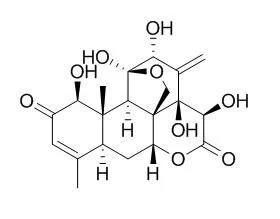| In vitro: |
| Molecules. 2014 Sep 16;19(9):14649-66. | | Eurycomanone and eurycomanol from Eurycoma longifolia Jack as regulators of signaling pathways involved in proliferation, cell death and inflammation.[Pubmed: 25230121] | Eurycomanone and eurycomanol are two quassinoids from the roots of Eurycoma longifolia Jack.
METHODS AND RESULTS:
The aim of this study was to assess the bioactivity of these compounds in Jurkat and K562 human leukemia cell models compared to peripheral blood mononuclear cells from healthy donors. Both Eurycomanone and eurycomanol inhibited Jurkat and K562 cell viability and proliferation without affecting healthy cells. Interestingly, Eurycomanone inhibited NF-κB signaling through inhibition of IκBα phosphorylation and upstream mitogen activated protein kinase (MAPK) signaling, but not eurycomanol.
CONCLUSIONS:
In conclusion, both quassinoids present differential toxicity towards leukemia cells, and the presence of the α,β-unsaturated ketone in Eurycomanone could be prerequisite for the NF-κB inhibition.
| | Phytomedicine. 2012 Jan 15;19(2):138-44. | | Eurycomanone suppresses expression of lung cancer cell tumor markers, prohibitin, annexin 1 and endoplasmic reticulum protein 28.[Pubmed: 21903368] | Bioactive compounds from the medicinal plant, Eurycoma longifolia Jack have been shown to promote anti-proliferative effects on various cancer cell lines.
METHODS AND RESULTS:
Here we examined the effects of purified Eurycomanone, a quassinoid found in Eurycoma longifolia Jack extract, on the expression of selected genes of the A549 lung cancer cells. Eurycomanone inhibited A549 lung cancer cell proliferation in a dose-dependent manner at concentrations ranging from 5 to 20 μg/ml. The concentration that inhibited 50% of cell growth (GI(50)) was 5.1 μg/ml. The anti-proliferative effects were not fully reversible following the removal of Eurycomanone, in which 30% of cell inhibition still remained (p<0.0001, T-test). At 8 μg/ml (GI(70)), Eurycomanone suppressed anchorage-independent growth of A549 cells by >25% (p<0.05, T-test, n=8) as determined using soft agar colony formation assay. Cisplatin, a chemotherapy drug used for the treatment of non small cell lung cancer on the other hand, inhibited A549 cells proliferation at concentrations ranging from 0.2 μg/ml to 15 μg/ml with a GI(50) of 0.58 μg/ml. The treatment with Eurycomanone reduced the abundance expression of the lung cancer markers, heterogeneous nuclear ribonucleoprotein (hnRNP) A2/B1, p53 tumor suppressor protein and other cancer-associated genes including prohibitin (PHB), annexin 1 (ANX1) and endoplasmic reticulum protein 28 (ERp28) but not the house keeping genes. The mRNA expressions of all genes with the exception of PHB were significantly downregulated, 72 h after treatment (p<0.05, T-test, n=9). These findings suggest that Eurycomanone at viable therapeutic concentrations of 5-20 μg/ml exhibited significant anti-proliferative and anti-clonogenic cell growth effects on A549 lung cancer cells.
CONCLUSIONS:
The treatment also resulted in suppression of the lung cancer cell tumor markers and several known cancer cell growth-associated genes. |
|






 Cell. 2018 Jan 11;172(1-2):249-261.e12. doi: 10.1016/j.cell.2017.12.019.IF=36.216(2019)
Cell. 2018 Jan 11;172(1-2):249-261.e12. doi: 10.1016/j.cell.2017.12.019.IF=36.216(2019) Cell Metab. 2020 Mar 3;31(3):534-548.e5. doi: 10.1016/j.cmet.2020.01.002.IF=22.415(2019)
Cell Metab. 2020 Mar 3;31(3):534-548.e5. doi: 10.1016/j.cmet.2020.01.002.IF=22.415(2019) Mol Cell. 2017 Nov 16;68(4):673-685.e6. doi: 10.1016/j.molcel.2017.10.022.IF=14.548(2019)
Mol Cell. 2017 Nov 16;68(4):673-685.e6. doi: 10.1016/j.molcel.2017.10.022.IF=14.548(2019)